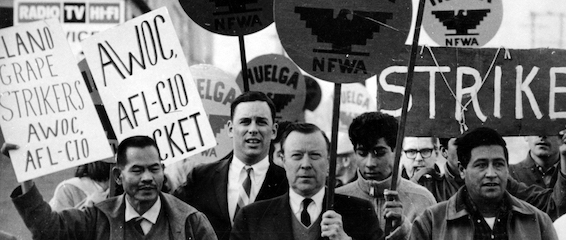
Delano Grape Strike (1965-70). A pivotal labor movement in the United States, lasting from September1965 until July 1970. It was initiated by the Agricultural Workers Organizing Committee (AWOC), a predominantly Filipino American labor group, to protest low wages and poor working conditions for grape farmworkers in Delano, California.
The strike later gained momentum when the predominantly Mexican American National Farm Workers Association, led by César Chávez and Dolores Huerta, joined the effort. This collaboration eventually led to the formation of the United Farm Workers (UFW) union, marking a significant moment in labor history.
Background
The strike was preceded by a successful grape strike in Coachella Valley earlier in 1965, where Filipino workers secured a wage increase. However, when the grape harvest moved to Delano, growers refused to match those wages, offering only $1.20 per hour—below the federal minimum wage. This prompted Larry Itliong and other AWOC leaders to vote for a strike on September 7, 1965.
Initially, tensions arose as growers hired Mexican workers to replace striking Filipinos, creating divisions between the two groups. To unify efforts, Larry Itliong approached César Chávez for support. After an emergency meeting on September 16, 1965—Mexican Independence Day—the NFWA voted overwhelmingly to join the strike. This marked the beginning of a historic partnership between Filipino and Mexican workers.
Key Events
- Nonviolent Resistance: The strike was characterized by nonviolent tactics inspired by Chávez’s philosophy. These included picket lines, marches, and consumer boycotts.
- Boycott Campaigns: The UFW organized nationwide boycotts of non-union grapes, urging consumers and businesses to stop purchasing products from growers who refused to negotiate.
- March to Sacramento: In 1966, Chávez led a 300-mile march from Delano to Sacramento to raise awareness about the workers’ plight.
- Union Contracts: After nearly five years of perseverance and public support for the boycott, major grape growers signed contracts with the UFW in July 1970. These agreements secured higher wages, better working conditions, and benefits for over 10,000 farmworkers.
Impact
The Delano Grape Strike was groundbreaking for several reasons:
- It united Filipino and Mexican workers in a common cause.
- It popularized nonviolent protest methods within labor movements.
- It led to the establishment of the UFW as a major labor union.
- It set a precedent for farmworker rights across the United States.
Legacy
The strike not only improved conditions for farmworkers but also highlighted the power of grassroots organizing and solidarity among diverse communities. It remains a landmark event in both Hispanic and Asian-American histories as well as labor rights movements in general.